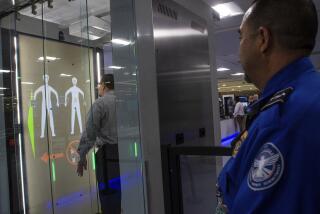Airport security procedures; job-creation efforts; corporations as ‘people’
Ideas for safer skies
Re “TSA is chatting to boost security,” Aug. 18
Why do Americans resist good ideas when they come from somewhere else?
Two weeks before the 9/11 attacks, my wife and I traveled through Stockholm’s airport. A man in a security uniform asked about our trip and our bags. I never felt safer flying anywhere.
I said at the time that it was the most useful screening, and we were treated with respect. I wondered why this was not implemented here; it could have prevented the 9/11 hijackings.
Now, nearly 10 years later, we have discovered a way to screen travelers more efficiently. Perhaps in another 10 years someone here may realize most Europeans have universal healthcare.
Terry Snyder
Los Angeles
The TSA continues its assault on the flying public’s civil liberties. Its latest program suddenly allows airport officials to become experts at reading passengers’ faces and labeling them as threats.
How can these experts decide who is a real threat and who is just genuinely irritated? Last August a ticket agent at Los Angeles International Airport so bungled my reservation to Hawaii that I surely would have been branded a “threat” if someone had read my face.
Kim Righetti
Upland
Creating jobs is the goal
Re “Obama may seek school fixes, tax breaks for hiring,” Aug. 18, and “Obama is pressed on job creation,” Business, Aug. 15
Gather from each state a list of top-priority infrastructure jobs. Then offer each state the needed funds. Let the members of Congress vote for or against their own states when such projects would employ many thousands of unemployed.
Obviously the local public pressure to accept such projects would be too much to turn down. For the die-hard anti-government GOP types, their terms in office would be seriously jeopardized by a negative vote or even verbal opposition to such job-creating projects.
Sol Taylor
Sherman Oaks
The Times repeats the canard that the president can create jobs. The president can only assist in cultivating a landscape that will facilitate job creation.
Unfortunately, this president is ideologically precluded from venturing anywhere in that direction.
Raymond G. Boyd
Somis, Calif.
Corporations as people
Re “That’s Mr. Mobil to you,” Opinion, Aug. 15
While Stephen Baker makes fun of Mitt Romney for saying “Corporations are people, my friend,” there is at least one sense in which economists would agree with Romney: Corporations don’t pay taxes, only people do. That is, while the treasurer of Exxon Mobil may send a check to the IRS, that alone tells economists nothing about who ultimately bears the real burden of this tax.
To determine that, we must look to “people,” either shareholders who might suffer reduced profits as a result of the tax or Exxon Mobil employees who may receive lower wages.
Though courts have ruled that corporations are “legal persons” — and yes, even have 1st Amendment rights — that doesn’t mean they have any taxpaying capacity independent of the “people.”
Robert Moore
San Marino
The writer is a professor of economics at Occidental College.
Under current law a corporation is a person, which is patently absurd and, if permitted to stand, leads to absurd law, such as the recent Supreme Court decision to open corporate floodgates into our political process under the guise of free speech.
Until General Electric feels the pangs of unrequited love, Apple hangs out with Exxon at the mall, AT&T drops off her kids at school or Wells Fargo makes the dean’s list, corporations can’t convince anyone that they are people.
Using the same logic, why not call any large organization a person — the Navy or any government department, for that matter? Corporations exist to make profits; to do so they make and sell stuff — and, oh yes, lobby for tax breaks.
Honeywell is not going to die of leukemia. Can we really afford to keep up this fiction?
John Howard
Los Angeles
The 11 million
Re “An immigration tangle,” Editorial, Aug. 17
The Times says, “The Obama administration can’t deport the estimated 11 million illegal immigrants living in this country, and the Department of Homeland Security must be free to focus enforcement efforts on those illegal immigrants who pose a real danger to communities, not those who are merely in this country to work.”
One finds numerous locations in L.A. where Latino males, presumably here illegally, can be found standing around in parking lots obviously without steady, ongoing means of support.
Though The Times harshly condemns the stronger enforcement measures enacted by state legislatures, it fails to address local legislation, like that of sanctuary cities, which encourages further illegal immigration by signaling that once a person successfully transitions across our borders, they are home free.
And considering that L.A. is basically a sanctuary city, perhaps The Times can explain how government can subsidize these illegal immigrants.
Jim Redhead
San Diego
Tax and spend
Re “Talking sense on tax reform,” Column, Aug. 17
L.A. Mayor Antonio Villaraigosa’s suggestion to remove businesses from the protections of Proposition 13 fails to take into account the cost to Californians. With an unemployment rate of 12%, the state is desperate to bring in new businesses and to keep the ones we have. Villaraigosa’s proposal does not help.
Higher taxes would mean, most likely, that businesses would pass on those costs to consumers, and that would mean less discretionary income for all Californians. Additionally, taking more revenue from businesses contributes to unemployment.
Taking from businesses to generate income for the state is not the answer. California must reduce its spending to match realistic income projections, without taking more from its residents, and fund programs that have been reprioritized to serve everyone.
This will contribute to a friendly business environment, stimulate the economy and lessen unemployment.
Charles Lomeli
Dixon, Calif.
The writer is treasurer, tax collector and clerk for Solano County.
Diploma time
Re “College: A smart choice,” Opinion, Aug. 15
Michael Greenstone and Adam Looney failed to take into account possible “confounders” when they concluded that going to college was a smart investment.
Those who go to college are likely to be wealthier, more motivated, more intelligent and work harder than those who do not go to college, and it could be these factors and not that they went to college that lead to future increased income.
In biomedical research, these factors are called confounders, and they need to be taken into account when interpreting results. Failing to do so can result in faulty conclusions
Theodore Friedman
Los Angeles
The writer is a professor of medicine at UCLA.
On ‘Idiocracy’
Re “Invasion of the idiocrats,” Opinion, Aug. 18
Great column, but I suspect that this term has been a regular feature of political discourse with anyone who has seen the movie “Idiocracy.” It immediately struck a chord, especially after the re-election of George W. Bush. I saw it when it opened in those scant few theaters and loved how the premise felt disturbingly prescient, even if the
execution was underwhelming.
However, I was disappointed to see Meghan Daum ignore the mastermind behind this neo-classic: Mike Judge. He deserved at least a mention in her column.
Todd Koerner
Hermosa Beach
More to Read
A cure for the common opinion
Get thought-provoking perspectives with our weekly newsletter.
You may occasionally receive promotional content from the Los Angeles Times.






